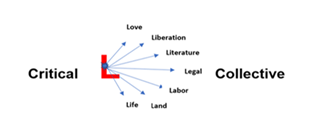Organizing for Democracy and Liberation: The Right to Learn, The Right to Teach & The Right to Thrive: CLC’s Inaugural Convening
By Athena D. Mutua, Angela P. Harris, and Francisco Valdes
Posted courtesy of The Baldy Center for Law and Social Policy, The Baldy Center Blog
On November 10-12, the Critical Legal Collective (CLC) will host its inaugural convening at Duke University Law School. CLC emerged in response to the anti-Critical Race Theory (CRT) campaigns sweeping the nation – campaigns meant to silence the discussion of structural racism in the United States. As its founders met and talked, an overarching mission emerged: protecting the right to teach critical thinking and theory, the right to learn critical thinking and thought, and the right to thrive as teachers and learners. Today, these rights are under attack from two directions: not only from right-wing ideology, but also from decades of neoliberal policy fostered on both sides of the American political aisle. Overcoming both – and their conjunction – is key to CLC’s long-term mission.
The theory behind neoliberalism is that governmental power is inherently prone to corruption, and that private markets freed from burdensome regulations are the best way to build wealth and to create and distribute the goods and services necessary for human flourishing. In practice, neoliberal policy has dramatically increased economic precarity and concentrated wealth in fewer and fewer hands. In K-12 education, neoliberal initiatives such as voucher programs, charter schools, state funding for parochial schools, and attacks on teachers and teacher unions seek to undermine public education and create opportunities for private profiteering. In higher education, neoliberal policy involves dramatic reductions in state funding (which have rendered colleges and universities increasingly dependent on student tuition and students increasingly dependent on loans), the gradual replacement of tenure-track faculty with poorly paid adjuncts denied security of employment, and the closing of humanities departments and programs that teach students to think critically about the present but which neoliberals deem unnecessary for the work they demand in today’s economy.
The slow erosion of education and other public institutions has recently been joined by a fast-moving and vicious ideological campaign manifested, in part, in donor attempts to influence faculty hiring, firing, and promotion, attacks on students who protest right-wing speakers or programs on their campuses, and myriad initiatives championing censorship, disinformation, and miseducation, often in the name of “protecting children” from facts and opinions that might cause them to ask questions or “feel uncomfortable.” Although the groundwork for this ideological campaign was laid in the 1970s, with the establishment of organizations such as the Heritage Foundation, the Cato Institute, the Manhattan Institute, and the American Legislative Exchange Council, since the Trump presidency we have seen a new level of aggression. Racial justice and broad diversity initiatives remain a central target, with the term “critical race theory” weaponized to inaccurately mark any project linked to anti-racism - equal justice under law - as an unacceptable attack on America. But the alliance made between political conservatives and Christian nationalists has deliberately added women and LGBTQ communities as campaign targets. Using the whip of “parental rights,” there has been an explosion of book bans, especially of books in which the protagonists are racial and sexual minorities, gender fluid people, and women.
As a recent CLC op-ed states, campaign proponents have spearheaded “over 600 local, state, and federal bills designed to chill basic conversations about racism, sexuality, and related topics; thousands of book bans; coordinated campaigns to defund or shutter public libraries; systematic efforts to eliminate fundamental safeguards that protect academic freedom and university independence; [and] renewed efforts to disenfranchise voters, criminalize protest and erode reproductive healthcare.” These actions harm not only the right to teach and to learn critically; they also harm the right of students and others to thrive: to see themselves represented in literature and history, to reckon with our country’s past, and to participate fully in the project of American democracy.
CLC’s inaugural conference seeks to confront both prongs of the attack on these rights. First, the organizers center the concept of “academic freedom” grounded in both US and international human rights law. For CLC, academic freedom protects not only institutions and personnel in higher education, but also K-12 institutions and public teachers. Academic freedom involves the right of teachers to teach, and the right of students to learn, critical thinking – a vital skill in this world where disinformation and misinformation are rampant. Second, CLC calls for faculty at all levels – from graduate students to adjuncts to the incredible shrinking tenure track – to organize collectively, and to bargain not only for workplace justice but for the common good. An educated – and critical – citizenry is necessary to sustain democracy. Education is, therefore, not a private but a public good.
In keeping with the high stakes of this moment, the 2023 CLC inaugural conference at Duke will depart from the usual academic norms by focusing on action, not just analysis. Its workshop format seeks to give participants knowledge they can use back in their home institutions, from a greater understanding of academic unions to new skills for teaching critical thinking. In this moment of crisis for education and democracy, CLC hopes to rekindle a spirit of solidarity, joy, and discovery.
